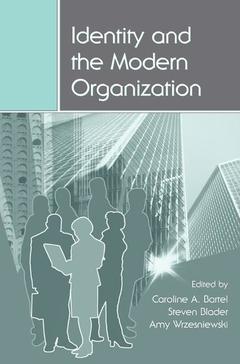Description
Identity and the Modern Organization
Organization and Management Series
Coordinators: Bartel Caroline A., Blader Steven, Wrzesniewski Amy
Language: English
Subjects for Identity and the Modern Organization:
Keywords
Organizational Identities; organizational; Interorganizational Competition; identification; BBC Prison Study; social; Social Identity Theory; theory; Self-categorization Theory; self-verification; Personal Self-views; organizations; Chronic; personal; Organizational Identification; self-views; Vice Versa; issue; Membership Claims; selling; Follow; Multiple Organizational Identities; Self-verification Motives; Self-verification Theory; Identity Ambiguity; Issue Selling; High Entitativity; Selfcategorization Theory; High Entitativity Groups; Extreme Uncertainty; Remote Work; Social Identity Processes; Part Iii; Organizational Memberships; Group Prototypes
Publication date: 12-2015
· 15.2x22.9 cm · Paperback
Publication date: 07-2007
286 p. · 15.2x22.9 cm · Hardback
Description
/li>Contents
/li>Readership
/li>Biography
/li>
Identity and the Modern Organization presents a lively exchange of ideas among psychology and management scholars on the realities of modern organizational life and their effect on the identities that organizations and their members cultivate. This book bridges the domains of psychology and management to facilitate a multi-disciplinary, multi-level integration of theory and research on identity processes.
The volume highlights answers to important questions raised by shifting organizational forms and arrangements, such as:
- How are identity processes affected by, and how do they affect, the motivations of individuals and organizations?
- How do identity and identification shape the social processes that unfold between individuals and groups?
- How do strong versus weak contexts affect identity processes as the boundaries of organizations and social categories within them become more permeable?
An effective tool for understanding a wide variety of organizational phenomena, this book is intended for scholars and students in the fields of management, organizational theory, organizational behavior, social psychology, and industrial/organizational psychology.
Contents: Part I:Introduction. S.L. Blader, A. Wrzesniewski,C.A. Bartel, Identity and the Modern Organization. Part II: Social Motivations in Modern Organizations. M.A. Glynn, C. Marquis, Legitimating Identities: How Institutional Logics Motivate Organizational Name Choices. M.A. Hogg, Organizational Orthodoxy and Corporate Autocrats: Some Nasty Consequences of Organizational Identification in Uncertain Times. S.L. Blader, Let’s Not Forget the “Me” in “Team”: Investigating the Interface of Individual and Collective Identity. B. Ashforth, Identity: The Elastic Concept. Part III:Social Processes in Modern Organizations. M.G. Pratt, K.G. Corley, Managing Multiple Organizational Identities: On Identity Ambiguity, Identity Conflict, and Members’ Reactions. C.A. Bartel, A. Wrzesniewski, B. Wiesenfeld, The Struggle to Establish Organizational Membership and Identification in Remote Work Contexts. S.A. Haslam, S. Reicher, Social Identity and the Dynamics of Organizational Life: Insights From the BBC Prison Study. A. Brief, E. Umphress, Lost in Identities: A Brief Tale of Two Explorers. Part IV: The Contextual Landscape of Modern Organizations. S. Spataro, J. Chatman, The Effects of Inter-Organizational Competition on Identity-Based Organizational Commitment. D.C. Seyle, W.B. Swann, Jr., Being Oneself in the Workplace: Self-Verification and Identity in Organizational Contexts. S. Ashford, M.A. Barton, Identity-Based Issue Selling. J. Dukerich, Identity and Beyond: Future Directions for Identity and Identification Research. Part V:Conclusion. D. Whetten, The Study of Organizational Member Identification: Organization-Appropriate Applications of Social Identification Theory.




